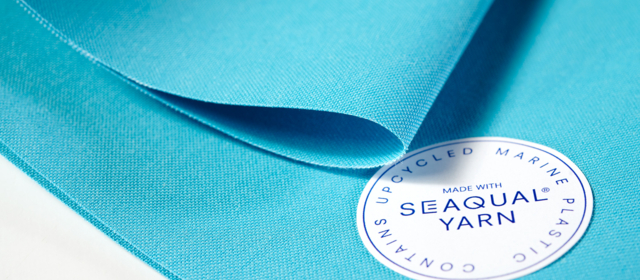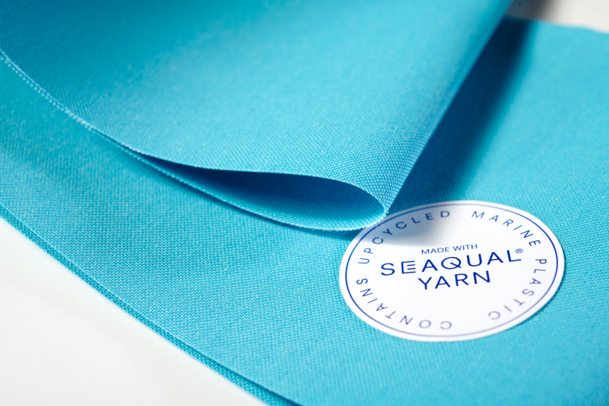Environmental protection – more than just a buzzword
Getzner Textil’s headquarters are located in one of the most beautiful regions in the world. For decades, the company management has therefore considered particularly sustainability and the protection of the environment, people and resources a priority, along with the customer benefit, when it develops its products.
The experienced team, the seventh generation of the family to run the business, is actively committed to continuously improving the eco-performance of all of the Group’s sites. The textiles company, whose roots go back 200 years, not only actively contributes to environmental protection but also demonstrates sustainability as one aspect of the corporate culture. “Of course, we are aware of the fact that the production process the textiles run through generally call for large quantities of energy, water and chemicals,” explains Roland Comploj, chairman of the management board and Getzner Textil AG CEO, with honest self-criticism, before continuing: “However, we constantly thoroughly examine all of our processes and look at our everyday procedures in detail: How can we reduce the energy consumption? How do we treat the waste water? Which chemicals do we use? Today, we can say with just a little pride that no other manufacturer offers this level of sustainability.”
Getzner solves tomorrow's problems today
The long-established Vorarlberg-based company has been working continuously on the reduction of its heat, water and electricity consumption for many years. On the one hand, this has been possible by using the latest technologies and on the other, through the ongoing modernisation and upgrading of its existing equipment. For example, Getzner has managed to reduce the specific heat requirements of the production facilities in Bludenz by more than a quarter since 2009 with the aid of targeted measures. The company’s outstanding efforts were recognised both in 2014 as well as 2018 by “klimaaktiv” – a climate initiative by the Federal Ministry of the Republic of Austria for Climate Action, Environment, Energy, Mobility, Innovation and Technology (BMK).
Actively demonstrated commitment to the company location
Getzner Textil’s future-focused and actively pursued environmental policies ensure the long-term security of its location. All raw materials are processed in accordance with the strictest environmental protection standards: Getzner’s products are certified to bluesign®, OEKO-TEX® Standard 100 and OEKO-TEX® STeP standard. Since 2018, the fashion fabrics made by Getzner also bear the “Made in Green by OEKO-TEX®” label – the highest accolade when it comes to sustainability.
Electricity generated by its own hydropower plants, district heating for the region
Getzner is one of Austria’s pioneers in the areas of electricity generation and supply. The former hydropower plants were already converted to the generation of hydroelectricity in the late 19th century, and new power plants went into operation. Today, the company’s own power station encompasses four active power plants in Bludenz and Bürs that cover the entire electricity consumption of all Getzner companies. In addition, Getzner Textil AG started to operate its own district heating network in 2001. “Since then, we have been supplying heat to numerous public buildings in the immediate vicinity of the company headquarters, as well as the local indoor and outdoor pool Val Blue. A sustainable project with a triple win-win situation – positive for the environment, the recipients and Getzner Textil as the energy supplier. The total carbon saved thanks to the district heating network amounts to around 1,000 tons per annum,” says Roland Comploj.
"Seaqual" – a concerted effort against ocean plastics
With the production of a 100 percent recyclable polyester fabric that is woven using a major proportion of “Seaqual” yarn, Getzner Technics is declaring war on ocean plastics and is once again setting a powerful example for the benefit of the environment. For example, up to 80% of one of the high-quality woven fabrics produced regionally at the headquarters of the group of companies in Bludenz consists of Seaqual polyester (PES, which is made of ocean plastics) that has been blended with a PES-based elastic fibre and is therefore fully recyclable. The PFC-free Seaqual PES functional fabrics are not only intentionally sustainable but beyond this also extremely versatile and perform outstandingly in a wide range of different areas of use – such as, for example, sportswear, but also wallets, bags or backpacks.
You can find more information about our sustainability efforts in our environmental brochure and on our YouTube channel.
Images: Marcel Hagen – Studio 22, Frl. Müller & Söhne, OEKO-TEX, bluesign, ÖKOPROFIT, Stocksy, GTAG


